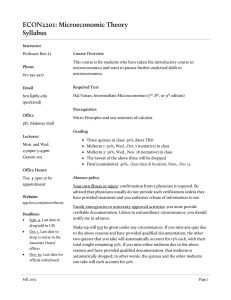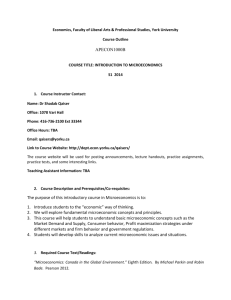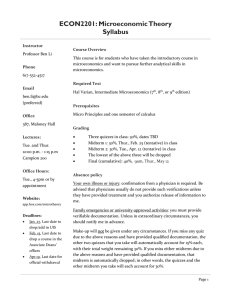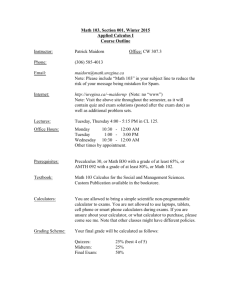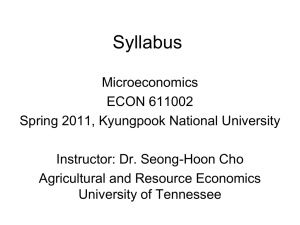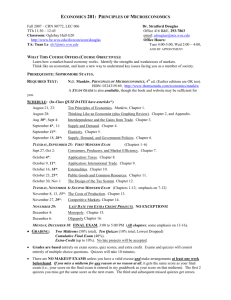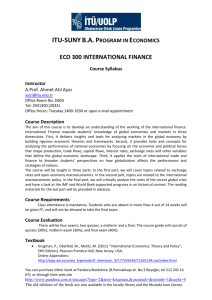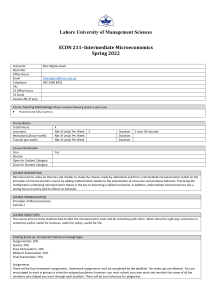Economics 200M Autumn 2012
advertisement
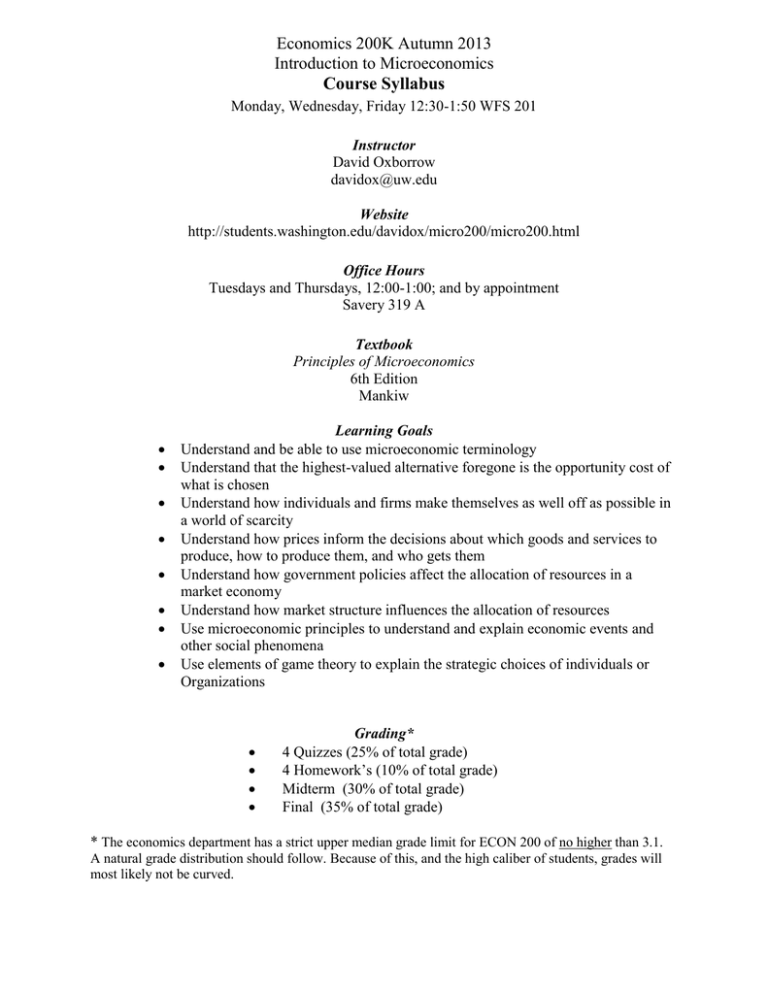
Economics 200K Autumn 2013 Introduction to Microeconomics Course Syllabus Monday, Wednesday, Friday 12:30-1:50 WFS 201 Instructor David Oxborrow davidox@uw.edu Website http://students.washington.edu/davidox/micro200/micro200.html Office Hours Tuesdays and Thursdays, 12:00-1:00; and by appointment Savery 319 A Textbook Principles of Microeconomics 6th Edition Mankiw Learning Goals Understand and be able to use microeconomic terminology Understand that the highest-valued alternative foregone is the opportunity cost of what is chosen Understand how individuals and firms make themselves as well off as possible in a world of scarcity Understand how prices inform the decisions about which goods and services to produce, how to produce them, and who gets them Understand how government policies affect the allocation of resources in a market economy Understand how market structure influences the allocation of resources Use microeconomic principles to understand and explain economic events and other social phenomena Use elements of game theory to explain the strategic choices of individuals or Organizations Grading* 4 Quizzes (25% of total grade) 4 Homework’s (10% of total grade) Midterm (30% of total grade) Final (35% of total grade) * The economics department has a strict upper median grade limit for ECON 200 of no higher than 3.1. A natural grade distribution should follow. Because of this, and the high caliber of students, grades will most likely not be curved. Some Main Topics and Readings 1 Ten Principles of Economics 2 Thinking Like an Economist 3 Interdependence and the Gains from Trade 4 The Market Forces of Supply and Demand 5 Elasticity and Its Application 6 Supply, Demand, and Government Policies 7 Consumers, Producers, and the Efficiency of Markets 8 Application: The Costs of Taxation 9 Application: International Trade 10 Externalities 11 Public Goods and Common Resources 12 The Design of the Tax System 13 The Costs of Production 14 Firms in Competitive Markets 15 Monopoly 16 Monopolistic Competition 17 Oligopoly 18 The Markets for the Factors of Production 19 Earnings and Discrimination 20 Income Inequality and Poverty 21 The Theory of Consumer Choice 22 Frontiers of Microeconomics Other Topics Textbook: The textbook we are using is Principles of Microeconomics by Mankiw. It is required for the course. Online homework is not required for the course so you may purchase a used copy. Homework and test questions may be pulled out of the applicable chapters (so you need the book). Quizzes: There will be 4 quizzes. The quizzes will test the topics from the previous sessions. There will be scheduled to take about 40 minutes. No calculator will be allowed. Homework: Homework assignments will be posted on my website or handed out in class. They will generally be due a week from when they were handed out. They will be a mix of questions from the book and my own written questions. Midterm Exam: The midterm is roughly scheduled to take place halfway through the quarter (about week 5). The midterm may have multiple choice questions, true false questions, explanation and graph questions, and calculation questions. The midterm will cover all the material up to the test date. No calculator will be allowed. Final Exam: The final may have multiple choice questions, true false questions, explanation and graph questions, and calculation questions. The final exam is semi-cumulative. What this means is that it will focus on the material after the midterm but I reserve the right to ask any number of questions that have already been asked on a quiz or the homework (with some modifications to the questions). The final exam day is listed as: Thursday, December 12th, from 8:30 - 10:20 am. THERE IS NO MAKE UP FOR THE FINAL. If you miss the final AND contact me afterwards (within 24 hours), you will receive an Incomplete as your grade for the course. If not, then you will receive a zero for the final exam grade and your final overall grade will be calculated as stated previously. No calculator will be allowed on the final exam. Make-up Exams: If any student misses a quiz or a test and would like to make it up they must present a doctor’s note explaining why they were absent on the testing day. All planned absences (ex. travelling team sports etc.) must be declared (and acknowledged by me) AT LEAST 48 hours prior to the exam date to receive a makeup. Makeup exams may not be the same test as the one given on the test day. THERE IS NO MAKE UP FOR THE FINAL. No calculator will be allowed. Special Requests: There will be no extra credit offered for this course. The tests will be weighted as explained in the syllabus. Any reweighting for one individual would not be fair for the rest of the class. Academic integrity: is the cornerstone of the Department’s rules for student conduct and evaluation of student learning. Students accused of academic misconduct will be referred directly to the Office of Community Standards and Student Conduct for disciplinary action pursuant to the Student Conduct Code and, if found guilty, will be subject to sanctions. Sanctions range from a disciplinary warning, to academic probation, to immediate dismissal for the Department and the University, depending on the seriousness of the misconduct. Dismissal can be, and has been, applied even for first offenses. Moreover, a grade of zero can be assigned by the instructor for the course.
